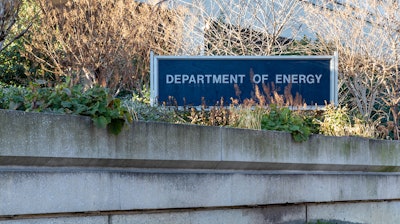
The U.S. Department of Energy (DOE) announced nearly $10 million for seven innovative projects that will accelerate development and testing of marine energy technologies.
Marine energy resources—such as wave, tidal and ocean and river currents—are abundant, predictable and complement other renewable energy sources. These investments advance research on wave-powered technology for use in seawater desalination and support a feasibility study for a potential ocean current test facility.
“Marine energy technologies have incredible potential to provide clean electricity as well as clean water,” said Alejandro Moreno, Acting Assistant Secretary for Energy Efficiency and Renewable Energy. “These projects represent DOE’s first significant investment in marine energy serving the blue economy market and will advance technologies that can meet these needs and help achieve President Biden’s goal of a net-zero-emissions economy by 2050.”
The seven projects announced today are part DOE’s Water Power Technologies Office’s (WPTO) Powering the Blue Economy Initiative and six advance solutions that could provide low-cost, emission-free and drought-resistant drinking water in disaster-relief situations and to small communities.
The seven projects focus on four areas:
Proving robust and reliable designs of wave-powered desalination systems
- Oneka Technologies USA, Inc.’s Oneka IceCube—Emergency Relief Wave-Powered Desalination (Fort Pierce, FL) - This project will optimize the Oneka IceCube, a wave-powered desalination device specifically designed for emergency relief applications and the grand prize winner of WPTO’s Waves to Water Prize. The team aims to reduce costs and improve technical performance, durability, and reliability to maximize water output, ease deployment and manufacturability, and prepare for commercialization. (Award amount: $1,996,849)
- Sea Potential, LLC’s DUO-DS Wave-Powered Desalination System Sea Trials (New Canaan, CT) - This project will deploy, test and accelerate commercialization of the DUO-DS wave-powered desalination device, which pumps seawater through a reverse osmosis membrane to generate freshwater. The team proposes a deployment off the coast of Massachusetts to capture performance data. (Award amount: $1,789,178)
- Water Bros Desalination, LLC’s Long-Duration Testing and Scalability of a Lightweight, Rapidly Deployable, Wave-Powered Reverse Osmosis System (Charlotte, NC) - This project aims to advance the Wave-Actuated, Tethered Emergency Response Buoyant Reverse Osmosis System (WATER BROS) desalination system, which was one of the finalists in WPTO’s Waves to Water Prize. The team plans three deployments at Jennette’s Pier in Nags Head, North Carolina, during which they will collect data, test and monitor device performance and instrumentation, analyze water quality and production, and monitor the environment where the device is deployed. (Award amount: $1,568,114)
Reducing risk and validating novel components in wave-powered desalination systems
- Oneka Technologies USA, Inc.’s Oneka IceCube—Subcomponents Breakthrough Innovations for Wave-Powered Desalination (Fort Pierce, FL) - This project aims to develop a self-cleaning seawater intake system, optimize system design to preserve the life of reverse osmosis membranes and lengthen the time between maintenance, and optimize hydraulic components (e.g., valves and pressure regulators) to increase system efficiency and uptime and reduce maintenance costs. The project team plans to validate these sub-components, including through in-ocean testing near Fort Pierce, Florida. (Award amount: $1,395,579)
- North Carolina State University’s Co-Design of the Pumping System and Controller for a Mobile, Anchorless, Wave-Powered Desalination Platform (Raleigh, NC) - This project will transform Liquid Robotics’ autonomous, uncrewed Wave Glider into a mobile, anchor-less desalination platform. The resulting system aims to be rapidly deployable from a near-shore location, able to desalinate up to 1,000 gallons of water, and able to immediately redeploy after offloading desalinated water. The project involves tank testing at the University of Michigan and open-water testing at Liquid Robotics’ Hawaii Marine Operations Facility and Test Range. (Award amount: $1,608,160)
Supporting advancements in marine energy desalination more broadly
- Binghamton University’s Off-Grid Tidal Turbine-Driven Centrifugal Reverse Osmosis System (Binghamton, NY) - This project will develop, test, and establish proof-of-concept for an integrated tidal desalination system, which creates drinkable water from rotational power of hydrokinetic turbines rather than electrical energy. The project team will conduct lab-scale turbine testing at Lehigh University’s Tidal Turbulence Test Facility. (Award amount: $607,819)
Evaluating the feasibility of establishing an ocean current testing facility to share testing costs across many developers and reduce barriers to testing
- Florida Atlantic University’s U.S. Ocean Current Marine Energy Test Facility Feasibility Assessment (Boca Raton, FL) - This project will assess the feasibility of establishing an ocean current test facility off the coast of Palm Beach County, Florida. This facility would provide grid-connected technology testing for current energy converters to de-risk and accelerate systems to commercial readiness. The feasibility assessment will include a preliminary analysis of infrastructure needs, coordination with regulatory agencies and stakeholders to develop an initial regulatory and permitting roadmap, and a preliminary economic impact assessment. (Award amount: $800,000)






















